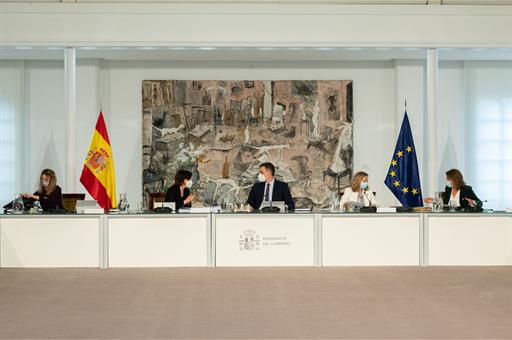Council of Ministers
Government approves direct aid for purchase of electric or plug-in hybrid vehicles and for installation of charging facilities
Council of Ministers - 2021.4.13
Moncloa Palace, Madrid
The Council of Ministers approved the third edition of the Incentives Programme for Efficient and Sustainable Mobility (MOVES III), which through direct aid, finances the acquisition of electric vehicles and plug-in hybrid vehicles, such as cars, vans and motorbikes, and the acquisition and installation of charging facilities.
New features of Plan
The programme, which may be further strengthened in the coming years, has a minimum allocation of 400 million euros, which may be extended to at least 800 million. The initiative, presented on Friday by the Fourth Vice-President of the Government and Minister for Ecological Transition and Demographic Challenge, Teresa Ribera, which involves the participation of the regional governments and the sector, is the first line of action of the Recovery, Transformation and Resilience Plan on sustainable mobility. This forms part of a broader package that will include actions on public transport, non-motorised mobility and low emissions zones.
Support for purchase of vehicles
The new edition of the MOVES Plan increases the direct aid for individuals and the self-employed, with financing for the purchase of a van of up to 9,000 euros, up to 7,000 euros for cars and up to 1,300 euros for motorbikes, if the user scraps a vehicle that is more than seven years old. If not, the support amounts to up to 4,500 euros for cars.
In turn, support for companies includes higher sums for SMEs and can amount to 4,000 euros for the purchase of an electric passenger car and up to 5,000 euros for the purchase of a van. The Plan also fosters the scrapping of vehicles, which is essential to reduce pollutant emissions, improve road safety and contribute to the circular economy. In this regard, on Tuesday, the government also pushed through more efficient and safer waste management of vehicles at the end of their useful life, transposing EU regulations in this regard.
Charging facilities
Public access facilities supported under the programme will have to guarantee their operability for at least five years and allow timely charging for electric vehicle users without the need take out a contract with the operator of the charging point.
The new line also improves support for the installation of charging facilities for individuals, owners' associations and small- and medium-sized enterprises, and for rapid and ultra-rapid charging points.
Support and deadlines strengthened under Plan
Support is strengthened with an additional 10% in three cases: the purchase of electric cars to be used as taxis or mini-cabs, actions in municipalities with less than 5,000 inhabitants and amounts for persons with reduced mobility that need to adapt their vehicles. In addition, this edition of the Plan maintains an additional discount of at least 1,000 euros from dealerships for the purchase of cars and vans.
Private individuals and the self-employed can benefit from the forms of support as from 10 April, while companies must wait for the Plan to be implemented by the regional governments, which will have a period of three months from the entry into force of the Royal Decree to introduce their rounds of support. MOVES II will remain in force until the end of these rounds in each region to avoid a period of time with no support.
Active employment policies
The government authorised the proposed regional distribution of the provision of funds managed by the regional governments with jurisdiction in the field of active employment policies. The amount totals 2.11 billion euros charged to the State Public Employment Service (Spanish acronym: SEPE).
The Employment and Labour Affairs Sector Conference will determine the final distribution of this amount. All the regional governments will receive the same or a greater amount to finance active employment policies in 2021 compared with the previous year.
This distribution of funds will be complemented with another item of 688 million euros charged to the Recovery, Transformation and Resilience Plan.
Comprehensive Employment Plan in Canary Islands
On the matter of employment, the Council of Ministers also approved the allocation of 42 million euros to develop the 2021 Comprehensive Employment Plan for the Canary Islands, which will include programmes to reduce unemployment on the islands, exacerbated by the economic effects stemming from the COVID-19 health crisis, and to maintain employment. It will also be designed to help the long-term unemployed, young people and to promote entrepreneurship.
The funds, charged to the State Public Employment Service (SEPE), will be distributed under an agreement with the Regional Government of the Canary Islands.
Support for industrial research projects
The government approved a round of aid for R&D+i in 'Strategic Lines'. Specifically, the Ministry of Science and Innovation, through the State Research Agency, will allocate 64.5 million euros to subsidies and 43 million to loans for industrial research projects involving the collaboration of research companies and institutions.
The projects selected will include a minimum sum of 400,000 euros and a maximum of 2 million euros and will have a duration of three years. Beneficiaries must make developments in both scientific knowledge and technological development in one of the 23 strategic lines selected, which span such diverse fields as batteries, cultural heritage, robots to assist people and rural depopulation.
Rural development programmes
The Council of Ministers authorised the distribution of 104.12 million euros for the rural development programmes of the regional governments. The decision will need to be ratified by the Agriculture and Rural Development Sector Conference.
The aim of these programmes is to improve the competitiveness of the agri-food sector, ensure the sustainable management of natural resources and achieve a balanced territorial development of rural areas.
Non official translation





